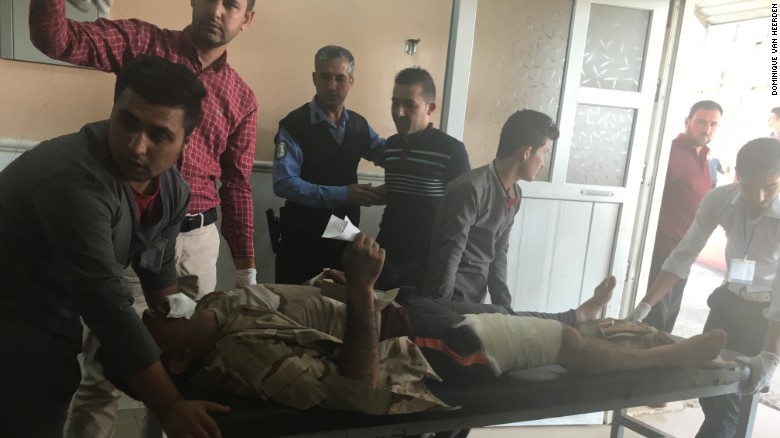Mosul: Hospital struggles to cope with battle injuries
Bloodied bandages are tossed aside and new ones applied to fresh wounds. As doctors and staff work in the controlled chaos, more ambulances arrive with more men cut and punctured by shrapnel from a car bomb. A man screams in pain as a doctor cleans a gaping wound on his thigh.
We are at al Shikan Hospital in Iraq's Nineveh province, just 45 kilometers (28 miles) from Mosul, where Iraqi troops and federal police are battling ISIS, and, in some areas, taking a beating.
Torn and bleeding
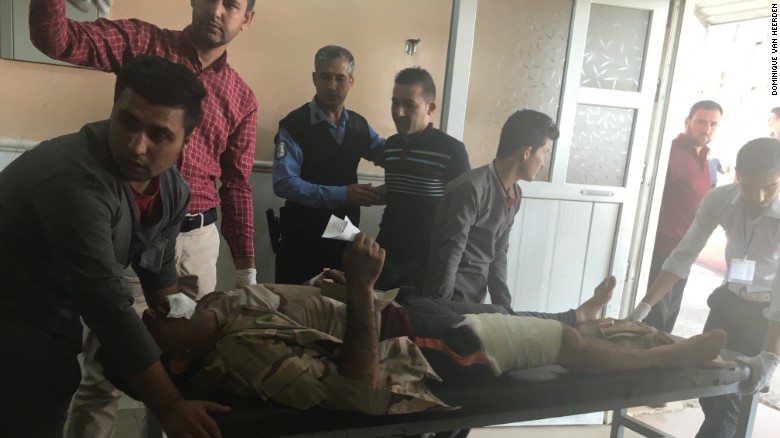
Another wounded man is tended at al Shikan hospital near Mosul.
Minutes earlier we had been talking with Qassem and Abdullah, two soldiers from the army's 16th Division who had been wounded along with five others by a car bomb as they fought ISIS in a village just north of Mosul last week. As we wrapped up the interview, word came of more casualties coming in.
Another car bomb had been targeted at Qassem and Abdullah's unit. Men who had survived the first bombing unscathed were now torn and bleeding from another attack.
MORE: CNN crew caught in ISIS crossfire
Abdullah looked aghast as he saw friends and comrades being brought in one after another. At one point he put a hand on the shoulder of one of the wounded being stretchered in, his uniform ripped and bloodied.
Perhaps a dozen, maybe more, arrived over the next hour or so. In the frenzied triage area it was difficult to keep count, with doctors and medics first having to decide who was the most badly hurt, who most urgently needed this hospital's one functional operating theater.
Fearful of the future
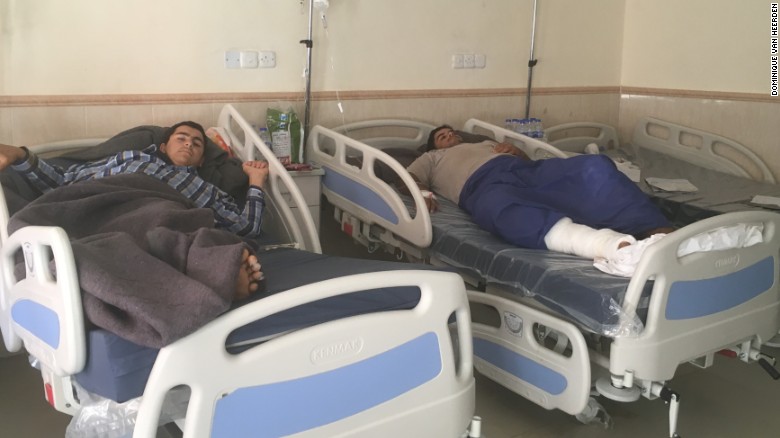
Taha and Tahseen recover from their injuries.
Al Shikan hospital wasn't set up for this. Before this war, it was not much more than the town's clinic, serving a district of 300,000 people. Today it is a frontline combat hospital -- dealing with the worst that modern weaponry can do to a body. To add to the workload, it is the only hospital in Nineveh province that is not controlled by ISIS.
They are doing what they can here, and doing it well, but the staff are fearful of what is to come. There are an estimated 1.2 million civilians in Mosul and ISIS is using many as human shields -- the militants even using occupied family homes as mortar or sniper positions.
The risks of civilian casualties in an urban combat environment is obvious. Adding a barbaric strategy of intentionally putting those civilians on the front line hardly bears thinking about.
Caught in the fighting
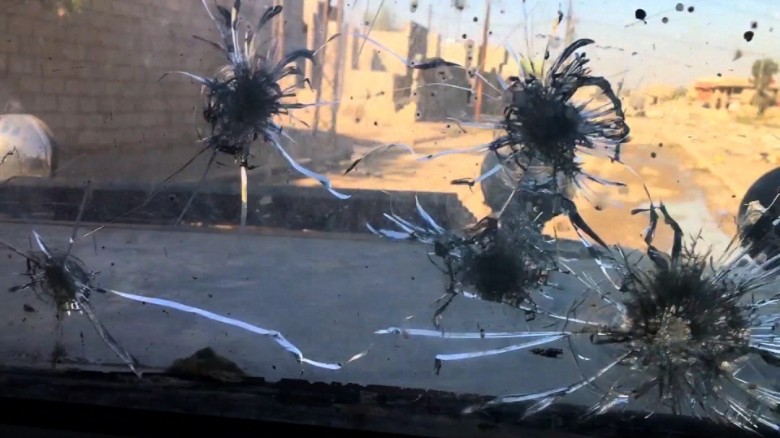
Exclusive: CNN reporter trapped in deadly ISIS attack
At al Shikan, the civilians have already started coming.
In one ward we meet Tahseen and, in the bed next to him, his nephew Taha.
Earlier this week, both they and their extended family were in their house in a village just east of Mosul. The fighting intensified over the day and then, in mid-afternoon, an artillery shell hit their home. Tahseen and Taha both suffered serious leg injuries but the news got worse -- Tahseen's two sisters aged 16 and 27 were both killed.
We also heard about 11-year-old Fadel. His father and two older brothers were killed, and he and his older sister wounded after a mortar landed on their home. Fadel received some treatment in his ISIS-held village, but after it was liberated he came here to al Shikan.
The International Committee of the Red Cross (ICRC) has done much for al Shikan -- building facilities, providing medical supplies and supplying two surgeons. But this war has changed the needs.
'Tip of the iceberg'
Eric Kwezi is the ICRC health delegate in this area. His biggest concern is that this place will see more and more wounded civilians -- and in numbers the hospital might not have the resources to deal with.
"Maybe more patients will get stuck, maybe they won't get access to healthcare -- that's my biggest concern," he said.
"I think right now we're seeing only the tip of the iceberg."
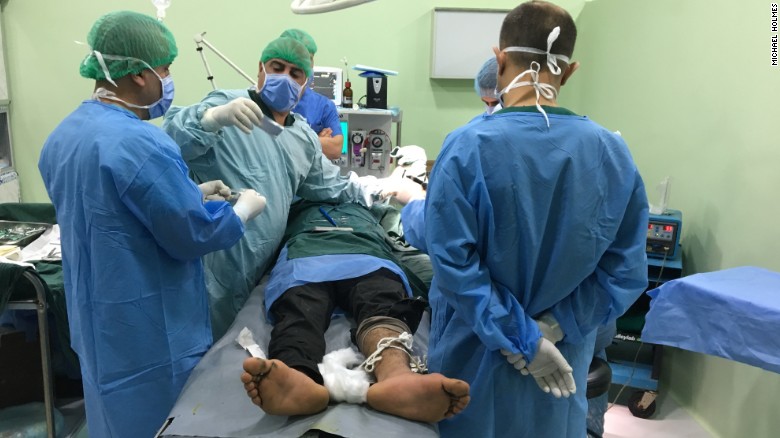
An injured man is treated by surgeons at al Shikan hospital.
The ICRC built two additional operating theaters at the hospital, but the equipment needed to make them functional is yet to be funded and so the hospital survives this growing crisis with just one theater which can handle two patients at a time.
Surgeons need more resources
Lead general surgeon Fouad al Abidaal says it's just not enough.
"We need equipment as soon as possible to make those other two operating theaters functional," he says as a soldier behind him in the functioning theater has large shrapnel wounds to his arms stitched.
In a side room off the main hospital corridor, a doctor is taking a break and it makes an incongruous sight. He sits and watches a television which is broadcasting live from the front line.
He is watching a battle that could -- and probably will -- send wounded or dying men for him to attempt to save.
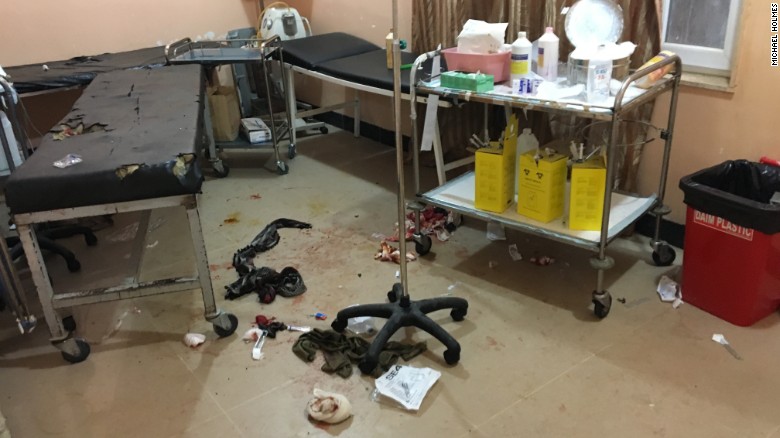
The bloody aftermath of treating people caught up in the fighting in and around Mosul.
As the emergency room recovers from the sudden influx of wounded, we see another side room with three empty gurneys, medical supplies, and gauze bandages with wet blood on the floor waiting for someone to pick them up.
News Courtesy: www.cnn.com

